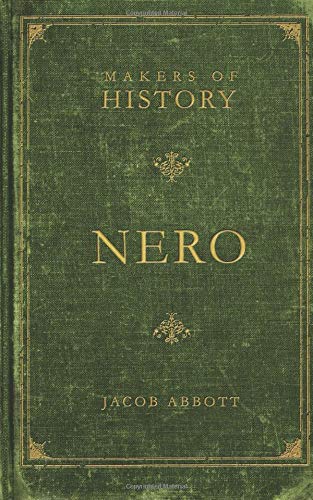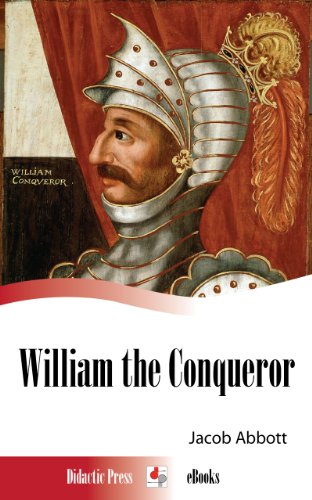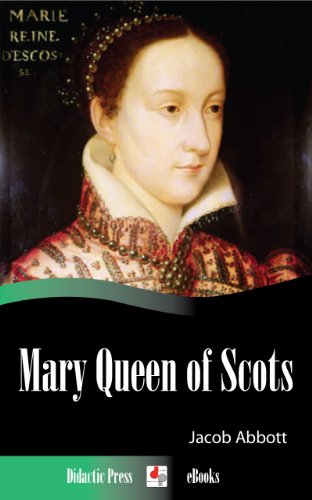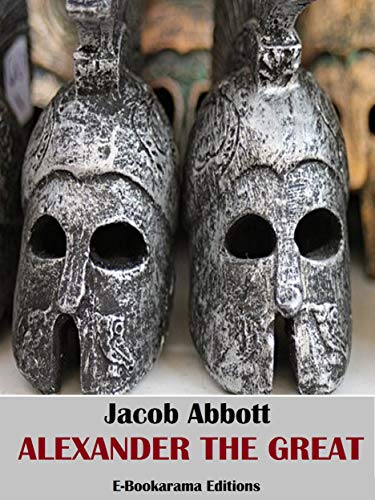-
Cyrus the Great: Makers of History
Jacob Abbott
language (e-artnow, May 15, 2020)"Cyrus the Great" is a biography of Cyrus II of Persia (c. 600-530 BC), the founder of the Achaemenid Empire, the first Persian Empire. Under his rule, which lasted c. 30 years, the empire embraced all the previous civilized states of the ancient Near East, expanded vastly and eventually conquered most of Western Asia and much of Central Asia. From the Mediterranean Sea and Hellespont in the west to the Indus River in the east, Cyrus the Great created the largest empire the world had yet seen. He respected the customs and religions of the lands he conquered, which became a very successful model for centralized administration and establishing a government working to the advantage and profit of its subjects. Cyrus the Great has been known for his innovations in building projects; he further developed the technologies that he found in the conquered cultures and applied them in building the palaces of Pasargadae. He is also well recognized for his achievements in human rights, politics, and military strategy, as well as his influence on both Eastern and Western civilizations.
-
William the Conqueror
Jacob Abbott
Hardcover (SMK Books, April 3, 2018)acob Abbott was a prolific author, writing juvenile fiction, brief histories, biographies, religious books for the general reader, and a few works in popular science. Check out the following list of books to take and exciting, informative, and easy to understand stroll through history.
-
How to Eat Food and Live to Tell the Tale: A Healthy Eating, Healthy Food Guide
Jamie Abbott
eBook (The Farm Publishing, March 14, 2018)It's not hard, the world just makes it confusing!This book is a back-to-basics guide on how to eat food, giving you the knowledge to discern which recipes and food will help you achieve your health goals.
-
Mary Queen of Scots
Jacob Abbott
Hardcover (Harper & Brothers, Jan. 1, 1904)286pp, 12mo
-
Makers of History: Nero: Makers of History
Jacob Abbott
Paperback (Canon Press, July 1, 2010)Nero! The name is both a shame and a shudder. In his life we are presented with an astonishing picture of human greed, cunning, and selfishness at its worst. And thanks to his prominent position, Nero's example of monstrosity has stood as a lesson and a warning to all men since. Born of Agrippina, of whom only such a son was worthy, he ran the gamut of every human crime and folly, making the Roman Empire minister to his atrocities. When he died, escaping human vengeance at the end, he lamented that so splendid a genius should have to pass away.This thrilling biography--written by Jacob Abbott and newly edited for younger readers--offers a glimpse into the life of this spoiled prince who became a royal monster.Nero is part of Makers of History, a 19th century biography series by two brothers--Jacob and John S.C. Abbott. Reprinted by Canon Press, these biographies have been edited and brought up-to-date for readers twelve and up. Not only are these editions given vintage style paperback covers, but they also include introductions that explain where these men and women fit into the timeline of history. Z
Z
-
Caleb in the Country
Jacob Abbott
Paperback (CreateSpace Independent Publishing Platform, June 3, 2018)Jacob Abbott (November 14, 1803 – October 31, 1879) was an American writer of children's books. On November 14, 1803, Abbott was born in Hallowell, Maine. Abbott's father was Jacob Abbott and his mother was Betsey Abbott. Abbott attended the Hallowell Academy. Abbott graduated from Bowdoin College in 1820. Abbott studied at Andover Theological Seminary in 1821, 1822, and 1824. Abbott was tutor in 1824–1825. From 1825 to 1829 was professor of mathematics and natural philosophy at Amherst College; was licensed to preach by the Hampshire Association in 1826; founded the Mount Vernon School for Young Ladies in Boston in 1829, and was principal of it in 1829–1833; was pastor of Eliot Congregational Church (which he founded), at Roxbury, Massachusetts in 1834–1835; and was, with his brothers, a founder, and in 1843–1851 a principal of Abbott's Institute, and in 1845–1848 of the Mount Vernon School for Boys, in New York City.
-
William the Conqueror
Jacob Abbott
Paperback (CreateSpace Independent Publishing Platform, Aug. 17, 2014)William the Conqueror is a classic English royal history biography by Jacob Abbott. William the Conqueror was the first Norman King of England, reigning from 1066 until his death in 1087. A descendant of Rollo, he was Duke of Normandy (as William II) from 1035 onward. After a long struggle to establish his power, by 1060 his hold on Normandy was secure, and he launched the Norman conquest of England six years later. The rest of his life was marked by struggles to consolidate his hold over England and his continental lands and by difficulties with his eldest son. William the Conqueror was the son of the unmarried Robert I, Duke of Normandy, by Robert's mistress Herleva. His illegitimate status and his youth caused some difficulties for him after he succeeded his father, as did the anarchy that plagued the first years of his rule. During his childhood and adolescence, members of the Norman aristocracy battled each other, both for control of the child duke and for their own ends. In 1047 William was able to quash a rebellion and begin to establish his authority over the duchy, a process that was not complete until about 1060. His marriage in the 1050s to Matilda of Flanders provided him with a powerful ally in the neighbouring county of Flanders. By the time of his marriage, William was able to arrange the appointments of his supporters as bishops and abbots in the Norman church. His consolidation of power allowed him to expand his horizons, and by 1062 William the Conqueror was able to secure control of the neighbouring county of Maine. In the 1050s and early 1060s William became a contender for the throne of England, then held by the childless Edward the Confessor, his first cousin once removed. There were other potential claimants, including the powerful English earl Harold Godwinson, who was named the next king by Edward on the latter's deathbed in January 1066. William argued that Edward had previously promised the throne to him, and that Harold had sworn to support William's claim. William built a large fleet and invaded England in September 1066, decisively defeating and killing Harold at the Battle of Hastings on 14 October 1066. After further military efforts William the Conqueror was crowned king on Christmas Day 1066, in London. He made arrangements for the governance of England in early 1067 before returning to Normandy. Several unsuccessful rebellions followed, but by 1075 William's hold on England was mostly secure, allowing him to spend the majority of the rest of his reign on the continent. William's final years were marked by difficulties in his continental domains, troubles with his eldest son, and threatened invasions of England by the Danes. In 1086 William ordered the compilation of the Domesday Book, a survey listing all the landholdings in England along with their pre-Conquest and current holders. William died in September 1087 while leading a campaign in northern France, and was buried in Caen. His reign in England was marked by the construction of castles, the settling of a new Norman nobility on the land, and change in the composition of the English clergy. He did not try to integrate his various domains into one empire, but instead continued to administer each part separately. William's lands were divided after his death: Normandy went to his eldest son, Robert Curthose, and his second surviving son, William Rufus, received England.
-
William the Conqueror
Jacob Abbott
eBook (Didactic Press, Dec. 31, 2013)An excellent narrative history of one of the greatest monarchs of England, William the Conqueror. Abbott's work spans the entirety of his life, culminating in the Battle of Hastings and the rule of William, known as the Conqueror. Illustrated throughout to enhance the reading experience.Contents include:Normandy.Birth of William.The Accession.William's Reign in Normandy.The Marriage.The Lady Emma.King Harold.The Preparations.Crossing the Channel.The Battle of Hastings.Prince Robert's Rebellion.The Conclusion.
-
Aprilly
Jane Abbott
Paperback (BiblioLife, Nov. 18, 2009)This is a pre-1923 historical reproduction that was curated for quality. Quality assurance was conducted on each of these books in an attempt to remove books with imperfections introduced by the digitization process. Though we have made best efforts - the books may have occasional errors that do not impede the reading experience. We believe this work is culturally important and have elected to bring the book back into print as part of our continuing commitment to the preservation of printed works worldwide.
-
History of William the Conqueror
Jacob Abbott
eBook (Skyhorse, Oct. 3, 2012)Jacob Abbott was one of the most prolific American writers of history in the nineteenth century, writing many biographies on the world’s most influential leaders in a clear and exciting style. This comprehensive volume, first published in 1849 and part of Abbott’s Illustrated Histories series, details the remarkable and fascinating life of William the Conqueror, the first Norman King of England. The king’s life is researched and recorded thoroughly, chronicling the years from his illegitimate birth to his calamitous burial. Born in Normandy and promised the throne of England by King Edward, William decided to invade the country after another contender for the crown took the throne. Abbott recounts the famous Battle of Hastings in great detail, and with an enthralling narrative captures the young conqueror’s struggles, ambition, and aspirations during his time in power. William the Conqueror’s reign in England significantly transformed the country, whose residents resented being ruled by a foreigner who relied entirely upon his army to keep the country in subjugation and who suppressed their many revolts. With a brief history of the Saxon and Danish kings of England and the dukes of Normandy, and original engravings, this book is great for anyone interested in the political struggles of the Middle Ages, and is a valuable addition to any history buff’s library.
-
Mary Queen of Scots
Jacob Abbott
eBook (Didactic Press, Dec. 30, 2013)A biographical history of the girl who became Queen: Mary, Queen of Scots. A truly tragic story of a girl who would become the embodiment of her own predestined tragedy, this eBook is a must-read for those looking to know more about one of the more fascinating British monarchs.Contents include: Mary's Childhood.Her Education in France.The Great WeddingMisfortunes.Return To Scotland.Mary and Lord Darnley.Rizzio.Bothwell.The Fall of Bothwell.Loch Leven Castle.The Long Captivity.The End.
-
Alexander the Great
Jacob Abbott
eBook (E-BOOKARAMA, May 2, 2019)Alexander the Great was one of the most successful military commanders in history, and was undefeated in battle. By the time of his death, he had conquered most of the world known to the ancient Greeks.In "Alexander the Great" Abbott recounts how Alexander ascended the Macedonian throne at the age of 20, overthrew his rival claimants, and then began preparations for the expedition against Persia. After defeating Darius, he proceeded to Egypt where he founded Alexandria, then turned back into Asia, where he subdued the most powerful nations, and in a span of eleven years conquered almost all of the known world. But, as his fortunes rose, his character deteriorated, and he died unexpectedly at the age of 33. "Alexander the Great" is one of many biographies aimed at young people written by Jacob Abbott and his brother. The biographies are written in such a way that makes them appealing and easily accessible to everyone.